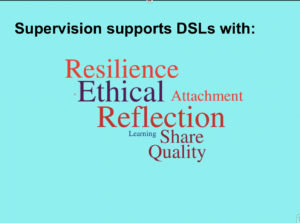Supervision now: emotional support and self-care for school staff during ordinary and extraordinary times
May 27, 2020 @ 12:20 pm
This blog is co-written with Jo Rowe. We are keen to promote supervision in schools and why we think it is such an important time now for schools to have supervision available for them.
What have we observed happening in education during a pandemic? It is our belief that schools have risen to the challenge of working with and supporting the children and young people in their care, as well as their families. Jo has been working with schools that are teaching the children of keyworkers, children with Education and Health Care Plans, children with a range of additional needs including those on the autistic spectrum and with anxiety, and those most vulnerable children in their communities. We know schools that are telephoning children and young people, and parents and carers on a weekly and sometimes daily basis. We know schools that have developed their IT to reach out to, teach and support children using Microsoft Teams, Zoom, Google classroom, and who are setting weekly challenges on their school websites or Facebook pages for children and parents to enjoy together. We’ve seen some great YouTube videos. We know schools that are setting and marking work online to keep children learning, particularly those who need the structure and routine. We know schools that are sewing masks and scrubs for Health Care professionals. We know schools that are making and delivering meals to ensure that vulnerable children in society are having at least one meal a day.
Whatever your role, school staff are helping the children, young people and their parents and carers in their local communities. Schools have always been, and continue to be, an important focus of support in their local communities.
The COVID 19 pandemic is global and has affected everybody living in the UK. Everyone has been locked down, and yet for each person that has produced a unique experience. Some children will have lived in families shielding someone at high risk of dying should they catch the virus, others will have witnessed exhausted, stressed and anxious parents trying to work (or worrying about not having work /income) and home schooling and others will have been bereaved. There will be a huge range of variables. The universality of the pandemic will produce shared challenges – what does ‘school’ mean now? How will social connections be made at a safe distance by managing to keep everyone apart? How will those social connections ensure the emotional responsiveness children and young people require with adults and their peers to learn and develop. How will the underlying anxiety about the uncertainty of who is at risk, how will the virus be managed and what impact will it have, be managed in such a way children feel safe enough to learn?
As schools prepare for more children and young people to return to their educational settings, whenever this may be, they will now face these new challenges. Schools will be considering the health and safety of their students, staff and their families. They may be considering whether they need to have PPE (personal protection equipment). They will be thinking about creative ways to ensure safe physical distance whilst maintaining social contact. They will be thinking about how to transition children back into their school settings and meeting their emotional and mental health needs whilst developing their social interaction and communication skills while maintaining a safe distance and possibly wearing a mask. There may be increased anxiety from students, staff and their families. And, there may be experience of bereavement for the children and young people, their families, school staff members and colleagues. How can school staff manage all these challenges and maintain their own well-being?
If people are exposed to high levels of anxiety and traumatic events without the opportunities to process and make sense of their experiences we know there is a risk of secondary trauma (sometimes known as vicarious trauma or burn out). Staff may become unwell or react unexpectedly. For some people they fear that catching COVID-19 may be life threatening and living with this anxiety could severely inhibit their usual functioning.
There are many ideas to support emotional and mental health needs in your personal life. Our particular favourites are: daily exercise in the form of a walk, being kind to others, a gratitude practice and being mindful. However, the focus of this blog is to consider what support you can receive in your professional life. Our collaboration began around understanding the benefits of supervision for ourselves in our individual careers as an Educational Psychologist and a Social Worker and noticing its significant omission in education.
Supervision that we have received, and offer to others, formalises an expectation of being supported to do the best job we are capable of. It facilitates discussion about anything that worries us, to draw on other’s experiences, knowledge and skills to brainstorm ideas. It allows us to ask for help when we need it. Supervision provides emotional support in an emotionally demanding and exhausting job. Supervision is a professional conversation. It is a method of offering managerial input, emotional support and enhancing professional development to staff. We have long advocated supervision in schools for those involved in safeguarding and promoting pastoral care of students. In these extraordinary and unprecedented times, never has supervision been needed more in our schools.
As schools move into the next phase they will encounter responses to the pandemic and reconnecting after lockdown that belong to the whole school, there will be individual needs expressed by staff and students and for some their ability to reconnect with school and learning will need specialist attention. The staff team will require creative, compassionate spaces to explore and process these experiences and find solutions that work. It is our belief that supervision could be that space.
If you want to find out more please click here
Alternatively contact me through the website.
Finding your way – Coping in the time of COVID-19
April 15, 2020 @ 12:46 pm
This is a short blog post with 3 main points designed to help you cope at what keeps being described as the strangest times of our lifetimes. Everyone has a slightly different challenge at present, so this is deliberately generalised. I am posting it on my website but will also be coming back to the issues on Twitter @practicematters and Facebook @pennyselfcare and am happy to discuss any points further. There are 3 main points I wish to make.
- Prioritise your well-being.
- Be realistic about managing your expectations of what you can do
- Stay connected to your emotional support group
1.Prioritise your wellbeing
Staying physically fit and emotionally well are essential. They may be bigger challenges now so think about how you can make sure you find time to exercise and eat healthily. Part of a coping mindset is to make the most of the opportunities that are available. If you are an adult at home with others, some of whom depend on you, then prioritising your own wellbeing is key to how well you all cope. The Government advice includes an expectation of ongoing exercise because it is such a key part of feeling ok about ourselves.
So top priority for managing your time is to exercise and have regular healthy meals. In my family we choose to exercise at different times, I like to start the day, and others prefer to end it, with exercise. My personal challenge is to make sure I complete 12,000 steps a day. One of my friends in the shielded category (no outside time) is running in front of the TV several times a day and beating me regularly to 30,000 steps. Others have run a marathon on their treadmill or in their garden. Many are doing #PEwithJoe or Yoga with Adriene. Some apps are free at the moment with exercise routines available that can be done in the home with no equipment. It matters less what you do, but that you do something that makes you out of breath and raises your heartbeat.
There are great benefits from going outside, so do take advantage of that time you are permitted to be out to notice the world around you which is changing daily. If you remember how important it is to you, and those you live with, to keep exercising, you will do it.
- Managing your expectations
Although this is useful advice in general, it is particularly important to pay attention to this at the moment. Set your own goals and notice when you achieve them. Make them realistic for your current situation and avoid using measures from a different time. If possible avoid comparison with others (on social media) and concentrate on what you are achieving. Making one of your goals doing your desired exercise and you will be in a positive mood quite quickly.
I find the method outlined below![]() helpful. What are my main goals for today and what am I grateful for/what was the best thing that happened? There is a space for the ongoing (things that have to be remembered) list but deciding what is your focus each day is useful. At times when I have been overwhelmed it might be my exercise, providing meals and getting a load of washing done. The emotional burdens we encounter will fluctuate but pay attention to what feels achievable each day and notice how you feel when you have ticked it off!
helpful. What are my main goals for today and what am I grateful for/what was the best thing that happened? There is a space for the ongoing (things that have to be remembered) list but deciding what is your focus each day is useful. At times when I have been overwhelmed it might be my exercise, providing meals and getting a load of washing done. The emotional burdens we encounter will fluctuate but pay attention to what feels achievable each day and notice how you feel when you have ticked it off!
What is also important is to notice the things you are grateful for about each day. Asking what the best thing was that happened in each day allows for those unexpected moments that give us joy to be really noticed and treasured. I am sure you are doing variations of this at meals/ in phone conversations as well; what was good about today, what was difficult, the good news / the bad news as methods of connecting; building our expectations of achievable goals and noticing what has brought us fun and joy.
- Staying connected
We are all finding new ways to be emotionally close while we are physically distanced. It is essential to make regular connections with the people who matter to you, whether family, friends or work colleagues. Who are the people you are missing and how do you make sure you still speak to them regularly? Someone said to me how nice it was to see a smiling face which I think is why we are moving to methods that allow us to see, as well as hear, each other. It’s important to notice those mutually supportive friendships and prioritise time to connect to them not just those you know require you to support them.
Social media and technology is helping us be creatively connected. I am constantly amazed at other people’s creativity; since being in lockdown I have taken part in virtual family quizzes, cocktail hours and Easter egg hunts, others have told me about their baking contests, bingo nights, pub quizzes and many more. I’m still trying to get the detail of how to play badminton virtually… Sometimes it’s helpful to have regular arrangements scheduled but there may be times and people who need to be spontaneously reached out to. We are all becoming proficient in online conference calling using a range of methods. My preference is Zoom as it works on all platforms/ range of devices and the app developers have quickly resolved the security issues. However find and use whatever works for you, your friends and family. Despite some understandable reticence all ages are sharing in online conference calling quite successfully when it becomes the best method for seeing those we love and want to remain connected to.
What now?
This was a brief post summarising the key factors for living well in these unusual times. There will be other ideas so please join in discussions on social media. If there are specific queries I can assist with I can be contacted using
@practicematters on Twitter and Penny Sturt Self-care trainer @pennyselfcare on Facebook.
My friend, Trudy Ritsema, IT Courses Dorchester is willing to assist anyone wanting advice about using their own technology or especially the new social media apps that are emerging. She is brilliant at sorting out glitches (by which I mean user errors!) and has helped behind the scenes in this blog.
Healthy connecting – managing demanding workplaces
March 17, 2015 @ 4:47 pm
When the workplace can make 24 hours a day demands on you how do you switch off and manage to hold onto reasonable expectations of yourself and your colleagues? Questions like this are beginning to filter into contemporary working life. Our flexible ways of working are actually making us feel more trapped than the rigidity of a 9-5 work day. Now we can work whenever we feel like it, many of us are finding it harder to carve out reasonable expectations of when we are at work and when we are not at work. How do you switch off the computer, tablet, phone and deal with the feeling you may risk missing something important?
These dilemmas have been raised both in training sessions and with peers; how to juggle the increasing demands placed by the technological changes brought into modern working life. Whether you are expected to work in close contact with people, because your office has become open plan without quite enough space for everyone, or whether you are working from home and rather isolated from a team environment; how to make meaningful contact and good relationships is a key task of surviving and thriving in a working and productive life.
In response to these questions, this course has been designed to give busy professionals a space to decide where their priorities are and how to reclaim control over their working life.
First course is booking now
Staying connected to the people who matter – family and friends as well as business contacts
Making the unmanageable manageable – what are reasonable expectations of yourself?
Developing resilience strategies – what are the core qualities of resilient people and how can these capacities be developed
Find out 18th May 2015 9.30 -4.30 here
Space
January 26, 2015 @ 12:00 pm
Recently I’ve been reflecting on space. How do we conceptualise space? Boundaries around space and spaces have been gradually eroded; the office is shared and usually there will not be enough desks for every worker. This is a deliberate policy.The idea that we use space to symbolise our identity and make our desks our safe working base has been removed from many workplaces. Space in which professionals see people has become a premium; patients are left on trolleys in corridors in hospitals; offices no longer have interview or play spaces for children and their families. The idea of neutral space in which to perform professional tasks is being gradually lost. Schools struggle to find spaces to offer parents or professionals meetings or have smaller groups of children. Training spaces have gone and been replaced with multi-functional rooms in which children and families may have contact as well as professional meetings being held including supervision. All of these bookable functions mean that there is never quite enough space for the people requiring it and the different functions of the task are not so easily accommodated. A room suitable for families to have contact in is not performing the same function as a meeting room or a training room or even a safe space for supervision. It also means everything has to be planned and booked in advance. Yet we know that in health, education and social care there is a need to be prepared for and responsive to the unexpected. Not having space to deal with the sudden disruptions that arise is problematic and causes additional and unnecessary stress.
Physical space has a price tag attached. There is little public acknowledgement about the need for emotional space that also encompasses physical space sometimes. Robin Murray, a leading psychiatrist once passed a comment during exploration of his life scientific (Radio 4) that has stayed with me, that if the housing situation was better in cities there would be a much lower rate of schizophrenia. Our mental health is improved when we have sufficient physical and emotional space. At a time when empty houses in London are increasingly under scrutiny is it time to ask questions about space and how it is used? Who has access to space and what is a fair distribution of space; according to need rather than only according to income?
Two observations have struck me in the last week; firstly the bafflement of a manager of a home saying we only have 4 beds why do I keep being asked to fill them with 5 bodies. To her the beds are peopled, to the commissioners they are commodities. This is a central paradox is space personal or is it merely a commodity. Secondly observing that the car parks of public buildings are full before 8.30 so people can get a parking space and have first option on the limited number of desks. Latecomers to training days explain that having travelled miles to unfamiliar venues they then struggle to get parked. It has become impossible to cater for everyone. Survival of the fittest indeed. Another experience of a similar phenomenon is trying to get onto the M3 from the M25. One of the downsides of life as a trainer is frequent travel. Currently there are roadworks at the junction for the M3 from either side of the M25. On one occasion it took me 2 hours to negotiate the last mile to the turn off. Essentially this is a space issue; too many cars wanting to use the same space at the same time. Of course there are solutions such as queue jumping and not being saintly I am sure I’ll be tempted to do that. However as with all forms of queue jumping some will pay more of a cost than others. Who is getting queue jumped over in our rush to space? Certainly those with caring responsibilities are not in a position to get into the office before 7.30 to offset the anxiety of space – parking/desk.
Space and access to it has become a major stressor in the way we live today.The extent to which we have control over the space, we individually feel we need, to live and work in really affects our sense of emotional well-being.





